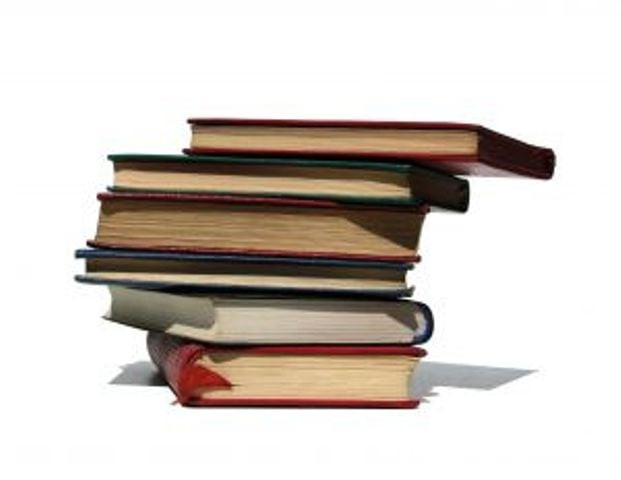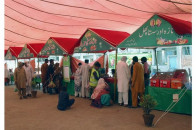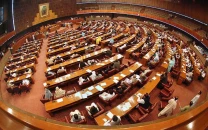Do you want an IB education for your child?
The popularity of the IB system is rising in Pakistan, with the promise of a revolution in education.

Rana is a thirty-year-old working woman and a mother of two, whose most recent pre-occupation has been to get her two-year-old son into a school. The frantic search is far from over. Among other things, she’s got sticky notes on her computer screen with names and addresses of different schools scribbled on them.
One such note displayed the words: Int. Bacca! “This is actually International Baccalaureate (IB)…I was kind of in a rush while taking that down,” Rana clarifies.
“It’s a new system, so I thought I should give this a try as well.” While Rana’s pursuit for the perfect preschool continues, let’s take this opportunity to delve deeper into this largely ‘under explored’ educational system.
Not all that new...
A little search on the internet will reveal that the International Baccalaureate or more commonly the IB system was initiated as far back as 1968 in Geneva, Switzerland. The idea was simply to make way for a globally uniform curriculum for globe-trotting students whose parents are constantly on the move.
This revolutionary idea has since caught up with rest of the world as well. Fairly recently, even the most conservative of educational set ups such as the one in the United Kingdom, began seeing it as a possible alternative to existing boards.
The system made its debut in Pakistan in 1996 when it was adopted by the International School in Karachi. With nearly three decades after its inception, the system is still not quite as popular as the O and A Levels system or the Aga Khan Board, but it is making inroads.
What’s it about anyway?
“If anybody wants to know what the IB system is, they should see Slumdog Millionaire…we call it an IB movie…it talks about learning through experience and that is what IB is all about…learning through experience!” explains Saira Minto Khan, Principal at the Ilmester Academy (an IB candidate* school).
It may sound too idealistic to be true but such a learning exchange is in fact being executed in schools around the globe that are following this system. “For instance, there was this one time that we had to teach the first graders about cavemen. Conventionally, this could have been done by making them read a chapter on cave people from a certain textbook yet with the IB system, we have room to be innovative. We, therefore, made them experience a whole exercise where they were made to understand for themselves how it may actually feel to be a caveman without any modern amenities!” explains Munizeh, the curriculum coordinator at the Ilmester’s.
“It’s not all that easy however,” remarks Khan on the enduring task this kind of teaching method can be for the teachers. “They have to be creative and time-efficient while following such a curriculum. In order to teach this way, you should really want to be a teacher!”
The IB system offers programmes for three different age groups: the Primary Year Programme (PYP) that is meant for the younger lot up to the fifth grade, the Middle Year Programme (MYP) for students between 11 to 16 years of age and the Diploma Programme (DP) for the 16 to 19 years age bracket. As the stages advance, the content matures, teaching and learning methods become more refined and assessment becomes more rigorous. Yet the underlying principles of learning through inquiry and experience along with research remain constant.
Many like to refer to this system as being for the ‘global citizen’ – a much needed entity for an increasingly inter related and inter dependent world facing common threats and challenges.
Unable to strike a chord…just yet!
Rana may just have driven across almost the entire length and breadth of Karachi in her perilous pre-school pursuit. Yet she is unable to make up her mind. While she has her reasons for not opting for a lot of well-known names, her reluctance towards an IB system school is an all too familiar concern.
“The system is too unconventional…I’m not sure if my child would be able to cope with a different system, in case I have to change his school for any reason in the future,” says Rana.
Proponents of the IB system agree that it’s always the parents who are the most difficult to convince of the merits of this alternative system of education. They are rightly concerned about the endurance of such an oddity in a competitive world that values grades over knowledge. If it’s any consolation at all, it is that the IB system does have its own version of assessment and examination to keep a track of students’ progress. Parents are, however, urged to be wary of comparing their child’s assessment with others, as every student has individual potential and students are marked according to this criteria rather than in comparison with anyone.
Moreover, parents in an inherently traditional society like Pakistan’s, tend to view any deviations from the norm with much suspicion. “The IB is a very flexible system when it comes to content. It encourages for the curriculum to be compatible with regional norms and realities,” explains Khan who daily placates such apprehensive parents.
Another widely held myth about the system is its supposedly ‘elitist’ image. With fees towards the higher side, the IB system is indeed accessible only to the upper and upper middle class in Pakistan. However, the system is essentially meant for everyone; a fact manifest just next door in India where a good fraction of the 76 IB schools serve all economic classes alike.
According to Khan, “The biggest hurdle, however, that stands resolutely in the way of the IB system from achieving a noticeable status in Pakistan is the state of security in the country that prevents auditors from flying in and evaluating the standards exercised in these IB schools.” Delays in auditing mean delays in registration, which creates more concern among parents about the authenticity of the schools where their children study.
The International School is at present the only school in Pakistan that is registered formally, while there are a host of others who, despite having applied well in time, are still awaiting the golden ticket.
A silver lining…
Despite gaining momentum around the globe, the progress is slow for this ‘revolutionary’ system in Pakistan. However, if it can withstand the test of time, the IB system does show the potential to shine as brightly as the General Certificate of Secondary Education (GCSE) O and A Levels system.
Despite the controversy and debate amidst which the O and A Levels set foot in Pakistan, the system is now well-known and well taken to. Every year, thousands of students sit through these exams and make way to both foreign and local universities.
While Rana’s choice of a school for her two-year-old still remains elusive, the fact that ‘Int. Bacca!’ made its way to this mother’s PC screen says something about the response the IB system is generating.
* Candidate schools are those which are under the registration process for the IB system.
Published in The Express Tribune, March 27th, 2011.



















COMMENTS
Comments are moderated and generally will be posted if they are on-topic and not abusive.
For more information, please see our Comments FAQ